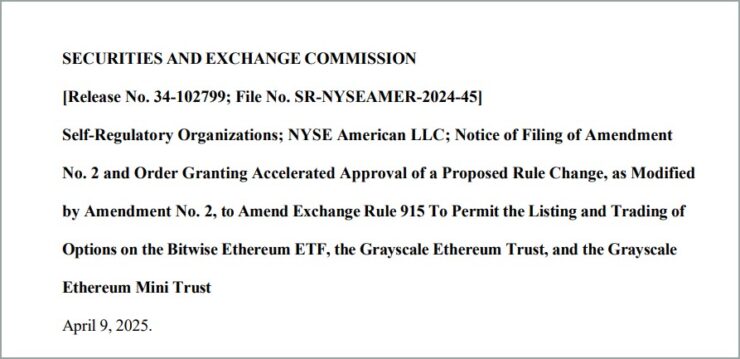The U.S. Securities and Exchange Commission has officially approved options trading for several spot Ethereum ETFs, marking another milestone in crypto’s convergence with traditional finance. According to regulatory filings published Wednesday, the green light applies to BlackRock’s iShares Ethereum Trust, Bitwise’s Ethereum ETF, and both the standard and Mini versions of Grayscale’s Ethereum Trust.
The decision allows U.S. investors to trade options contracts tied to these ETFs—financial instruments that offer the right, but not the obligation, to buy or sell the underlying fund at a fixed price by a specific date. This introduces new flexibility for traders seeking to hedge positions, manage exposure, or speculate on Ethereum’s future price movements without directly holding the asset.

These ETFs already provide exposure to Ethereum without requiring investors to manage private wallets or custody solutions. Now, with options trading enabled, the financial tools available to institutions and sophisticated retail traders are expanding rapidly.
Enhancing Investment Strategies with Options
Options are financial derivatives that grant investors the right—but not the obligation—to buy or sell an underlying asset at a predetermined price within a specified timeframe. By permitting options trading on Ethereum ETFs, the SEC enables investors to deploy more advanced strategies, such as hedging against price volatility or speculating on Ethereum’s future performance without holding the cryptocurrency itself.
The SEC’s approval covers several prominent Ethereum ETFs:
- BlackRock’s iShares Ethereum Trust – Managed by the world’s largest asset manager, this ETF offers broad exposure to Ethereum’s market performance.
- Grayscale’s Ethereum Trust and Ethereum Mini Trust – These vehicles have long provided institutional and retail investors with regulated access to Ethereum.
- Bitwise Ethereum ETF – Known for its crypto-focused portfolio, Bitwise’s fund aims to simplify Ethereum exposure for a broader investor base.
Ethereum Options Market Set to Deepen Liquidity
Options trading has long been a cornerstone of institutional market strategies, and its expansion into crypto ETFs is no exception. With the SEC’s latest approval, traders can now use Ethereum ETF options to speculate on price swings or hedge portfolio exposure—without needing to hold the underlying ETH tokens.
Unlike traditional spot trading, options give investors leveraged access to future price direction, enabling greater flexibility and risk management. Analysts note that in traditional markets, the volume of options often dwarfs spot market activity—and Ethereum’s inclusion is expected to significantly boost liquidity within crypto finance.
This development follows the SEC’s earlier approval of both spot Bitcoin ETFs and their corresponding options, continuing a broader push to standardize crypto exposure through regulated financial instruments.
Ethereum Lags Bitcoin as Altcoin ETF Race Heats Up
While Bitcoin ETFs have seen record-breaking inflows and helped drive fresh all-time highs for the world’s largest cryptocurrency, Ethereum-based funds have yet to capture the same level of enthusiasm. Despite the approval of spot Ethereum ETFs and now their associated options, trading volumes and fund flows remain modest by comparison.
Still, the momentum behind regulated crypto investment vehicles continues to grow. Several major asset managers are now pursuing ETF proposals for other top altcoins, including Solana, XRP, and even Dogecoin. These filings reflect a growing appetite to diversify crypto exposure beyond the Bitcoin-Ethereum axis—particularly as institutional investors seek broader access to the digital asset market.
The SEC’s approval of Ethereum ETF options could pave the way for similar instruments linked to other tokens, potentially opening the door to a broader and more dynamic market for crypto-based financial products.
Quick Facts
- The SEC approved options trading on Ethereum ETFs from BlackRock, Grayscale, and Bitwise on April 9, 2025.
- Options allow investors to hedge or speculate on Ethereum’s price movements without directly owning the asset.
- This decision is expected to enhance market liquidity and attract more institutional investors to the Ethereum market.





